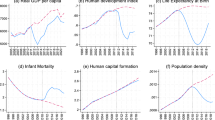Abstract
Using a unique dataset of the personal characteristics of national finance ministers in Western Europe (1980–2010), I show that a finance minister’s experience affects the national debt-to-GDP ratio. The increase in the debt-to-GDP ratio is smaller if the finance minister stays in office for an additional year. This result is robust to the inclusion of the personal characteristics of prime ministers and a measure of political stability. However, the magnitude of the effect is sensitive to how finance ministers are selected in the econometric model when more than one minister holds office during a particular year. The estimation of interaction terms further reveals that experience particularly matters in election years or in times of negative GDP growth because an experienced finance minister has the power to restrict the usual increase in the debt-to-GDP ratio. In contrast, a finance minister’s educational background and ideological leaning have no significant impact on the debt-to-GDP ratio.

Similar content being viewed by others
Notes
As an example, de Haan et al. (2013) show that independent of the type of budget process employed, strong ideological fragmentation reduces the deficit bias.
The countries are Austria, Denmark, Finland, France, Germany, Greece, Ireland, Italy, Luxembourg, the Netherlands, Norway, Portugal, Spain, Sweden, and the United Kingdom.
There are few cases in which former finance ministers are reappointed to office. In these cases, the initial value for the second term is given by the maximum of this variable from the first term.
The results obtained for Luxembourg hold exceptional status owing to the long tenure of Jean-Claude Juncker, who served as Luxembourg’s finance minister from July 14, 1989, until July 23, 2009.
Because approximately 70–80 % of the finance ministers in the sample period have studied economics, law, or both economics and law, a further subdivision of the remaining educational categories is not required.
Finance ministers who are not affiliated with a particular party are labeled according to the ideological majority of the governing parties.
The periods are 1980–1997 in the United Kingdom, 1985–1992 in Greece and 1980–1981 in Norway. To verify the comparability of measurement, the first five years of overlapping data periods are compared. For each of the three countries, the difference in the central government debt-to-GDP ratio between the two datasets is <0.2 percentage points per year, which should yield unbiased results.
The empirical evidence for electoral cycles is ambiguous: Shi and Svensson (2006) provide evidence that elections affect budget deficits especially in developing countries. In contrast, Klomp and Haan (2013a) argue that the impact of elections on fiscal policy outcomes depends on various factors, such as the country’s political system, degree of democracy or membership in a monetary union.
It is important to note that the results provide information on the absolute impact of the finance minister’s characteristics. The relative impact of the finance minister’s characteristics on the cabinet might also be important. Answers to this question, however, are beyond the scope of this paper and are open to further research on this topic.
To control for a non-linear relationship, I have also included the first and second polynomial of the years in office measure and age. None of these variables return statistically significant coefficients.
Using the overall KOF globalization index does not reveal a statistically significant impact.
Initial evidence of this link is provided by Somogyi (2010); see the literature review.
For each group, an F-test on joint significance supports the null hypothesis that there is no joint impact of any particular group of variables on changes in the debt-to-GDP ratio. In contrast, for the remaining groups of variables (e.g., the finance minister’s and prime minister’s previous years as cabinet members), the F-statistic supports the inclusion of these measures. Furthermore, the F-statistic on the joint impact of the different fixed effects and the country-specific trend also justifies their inclusion.
Owing to space limitations, the covariates are not presented. The results are available upon request.
Hats indicate the sample estimates. A similar approach holds for election years.
I am particularly thankful to one of the reviewers for pointing this out.
The estimated coefficients for a finance minister’s years in office/interaction effect are −0.424***/+0.062*** in the case of the interaction with the real growth of GDP and −0.344**/+0.010 for the interaction with the unemployment rate.
The figures are shown in a web appendix, which is available at http://ftp.zew.de/pub/zew-docs/div/WebAppendix_FinanceMinister2013.pdf.
All figures and robustness tables are available in the web appendix.
The STATA command is xtlsdvc. I used Arellano-Bond as the initial consistent estimator. The bootstrap procedure for standard errors with 200 repetitions is employed.
There are 65 observations in which the selected finance ministers differ. Table AA5 in the web appendix provides information on the years by country in which there is a difference.
References
Besley, T., Montalvo, J. G., & Reynal-Querol, M. (2011). Do educated leaders matter? The Economic Journal, 121, 205–227.
Borge, L.-E. (2005). Strong politicians, small deficits: Evidence from Norwegian local governments. European Journal of Political Economy, 21(2), 325–344.
Brambor, T., Clark, W. R., & Golder, M. (2006). Understanding interaction models: Improving empirical analyses. Political Analysis, 14, 63–82.
Brender, A., & Drazen, A. (2008). How do budget deficits and economic growth affect reelection prospects? Evidence from a large panel of countries. American Economic Review, 98(5), 2203–2220.
Cusack, T. R. (1997). Partisan politics and public finance: Changes in public spending in the industrialized democracies, 1955–1989. Public Choice, 91(3), 375–395.
de Haan, J., Jong-A-Pin, R., & Mierau, J. O. (2013). Do budgetary institutions mitigate the common pool problem? New empirical evidence for the EU. Public Choice, 156(3–4), 423–441.
de Haan, J., & Sturm, J.-E. (1994). Political and institutional determinants of fiscal policy in the European community. Public Choice, 80(1–2), 157–172.
de Haan, J., & Sturm, J.-E. (1997). Political and economic determinants of OECD budget deficits and government expenditures: A reinvestigation. European Journal of Political Economy, 13(4), 739–750.
Debrun, X., Moulin, A., Turrini, J. A.-i.-C., & Kumar, M. (2008). Tied to the mast? National fiscal rules in the European Union. Economic Policy, 23(54), 297–362.
Dreher, A. (2006). Does globalization affect growth? Empirical evidence from a new index. Applied Economics, 38(10), 1091–1110.
Dreher, A., Gaston, N., & Martens, P. (2008). Measuring globalization—gauging its consequences. New York: Springer.
Dreher, A., Lamla, M. J., Rupprecht, S. M., & Somogyi, F. (2009). The impact of political leaders’ profession and education on reforms. Journal of Comparative Economics, 37, 169–193.
Edin, P.-A., & Ohlsson, H. (1991). Political determinants of budget deficits: Coalition effects versus minority effects. European Economic Review, 35(8), 1597–1603.
Farvaque, E., Hammadou, H., & Stanek, P. (2011). Selecting your inflation targeters: Background and performance of monetary policy committee members. German Economic Review, 12(2), 223–238.
Feld, L. P., & Kirchgässner, G. (2001). Does direct democracy reduce public debt? Evidence from Swiss municipalities. Public Choice, 109(3–4), 347–370.
Feld, L. P., & Schaltegger, C. A. (2010). Political stability and fiscal policy time series evidence for the Swiss federal level since 1849. Public Choice, 144(3), 505–534.
Göhlmann, S., & Vaubel, R. (2007). The educational and occupational background of central bankers and its effect on inflation: An empirical analysis. European Economic Review, 51(4), 925–941.
Hahm, S. D., Kamlet, M. S., & Mowery, D. C. (1996). The political economy of deficit spending in nine industrialized parliamentary democracies: The role of fiscal institutions. Comparative Political Studies, 29(1), 52–77.
Hallerberg, M., Strauch, R., & von Hagen, J. (2007). The design of fiscal rules and forms of governance in European Union countries. European Journal of Political Economy, 23(2), 338–359.
Hallerberg, M., Strauch, R., & von Hagen, J. (2009). Fiscal governance in Europe. New York: Cambridge University Press.
Hallerberg, M., & von Hagen, J. (1999). Electoral institutions, cabinet negotiations, and budget deficits. In J. M. Poterba & J. Von Hagen (Eds.), Fiscal institutions and fiscal performance (pp. 209–232). Chicago: University of Chicago Press.
Hallerberg, M., & Wolff, G. B. (2008). Fiscal institutions, fiscal policy and sovereign risk premia in EMU. Public Choice, 136(3–4), 379–396.
Heinemann, F., Mohl, P., & Osterloh, S. (2009). Who’s affraid of an EU tax and why?-revenue system preferences in the European parliament. Review of International Organizations, 4, 73–99.
Jaimovich, D., & Panizza, U. (2006). Public debt around the world: A new dataset of central government debt. Washington: Inter-American Development Bank.
Jochimsen, B., & Nuscheler, R. (2010). The political economy of the German Länder deficits: Weak governments meet strong finance ministers. Applied Economics, 43(19), 2399–2415.
Jochimsen, B., & Thomasius, S. (2012). The perfect finance minister: Whom to appoint as finance minister to balance the budget? DIW Discussion Papers No. 1188.
Jones, B. F., & Olken, B. A. (2005). Do leaders matter? National leadership and growth since World War II. Quarterly Journal of Economics, 120(3), 835–864.
Klomp, J., & de Haan, J. (2013a). Do political budget cycles really exist? Applied Economics, 45, 329–341.
Klomp, J., & de Haan, J. (2013b). Political budget cycles and election outcomes. Public Choice, 157(1–2), 245–267.
Neck, R., & Getzner, M. (2001). Politico-economic determinants of public debt growth: A case study for Austria. Public Choice, 109(3–4), 243–268.
Nickell, S. (1981). Biases in models with fixed effects. Econometrica, 49(6), 1417–1426.
O’Roark, J. B., & Wood, W. C. (2011). Determinants of congressional minimum support: The role of economic education. Public Choice, 147, 209–225.
Perotti, R., & Kontopoulos, Y. (2002). Fragmented fiscal policy. Journal of Public Economics, 86(2), 191–222.
Roubini, N., & Sachs, J. D. (1989a). Government spending and budget deficits in the industrial countries. Economic Policy, 4(1), 99–132.
Roubini, N., & Sachs, J. D. (1989b). Political and economic determinants of budget deficits in the industrial democracies. European Economic Review, 33(5), 903–933.
Shi, M., & Svensson, J. (2006). Political budget cycles: Do they differ across countries and why? Journal of Public Economics, 90(8–9), 1367–1389.
Somogyi, F. (2010, December). Essays in political economy and fiscal policy. KOF Dissertation Series No. 5, Zurich.
Swank, O. H. (2002). Budgetary devices for curbing spending prone ministers and bureaucrats. Public Choice, 111, 237–257.
van der Ploeg, F. (2010). Political economy of prudent budgetary policy. International Tax and Public Finance, 17, 295–314.
Volkerink, B., & de Haan, J. (2001). Fragmented government effects on fiscal policy: New evidence. Public Choice, 109(3–4), 221–242.
von Hagen, J. (2002). Fiscal rules, fiscal institutions, and fiscal performance. The Economic and Social Review, 33(3), 263–284.
von Hagen, J., Hallett, A. H., & Strauch, R. (2001). Budgetary consolidation in EMU. CEPR Economic Papers, 148, 140.
Woldendorp, J., Keman, H., & Budge, I. (2011). Party government in 40 democracies 1945–2008. Composition—duration—personnel. http://www.fsw.vu.nl/en/departments/political-science/staff/woldendorp/party-government-data-set/index.asp.
Woo, J. (2003). Economic, political, and institutional determinants of public deficits. Journal of Public Economics, 87, 387–426.
Acknowledgments
I am grateful to two anonymous reviewers and the Editor-in-Chief, William F. Shughart II, for their very helpful suggestions, which have significantly improved the paper. Furthermore, I thank Etienne Farvaque, Jakob de Haan, Friedrich Heinemann, Tanja Hennighausen, Konrad Stahl and Mustafa Yeter, my colleagues at the ZEW, as well as session participants at the annual meeting of the Verein für Socialpolitik 2011, the 2nd World Congress of the Public Choice Societies 2012, the 68th Congress of the International Institute of Public Finance 2012 and the 18th Spring Meeting of Young Economists 2013 for their valuable comments. Research assistance from Elisabeth Artmann, Marius Maximilian Benden, and Laura Renner is gratefully acknowledged.
Author information
Authors and Affiliations
Corresponding author
Appendix
Appendix
Complementary material for this paper is presented in a web appendix, which is available at http://ftp.zew.de/pub/zew-docs/div/WebAppendix_FinanceMinister2013.pdf.
Rights and permissions
About this article
Cite this article
Moessinger, MD. Do the personal characteristics of finance ministers affect changes in public debt?. Public Choice 161, 183–207 (2014). https://doi.org/10.1007/s11127-013-0147-x
Received:
Accepted:
Published:
Issue Date:
DOI: https://doi.org/10.1007/s11127-013-0147-x




